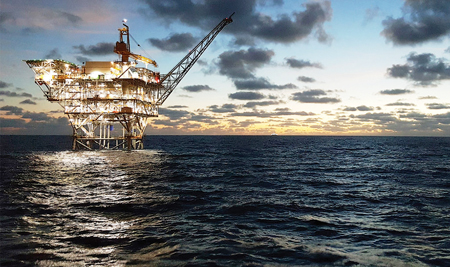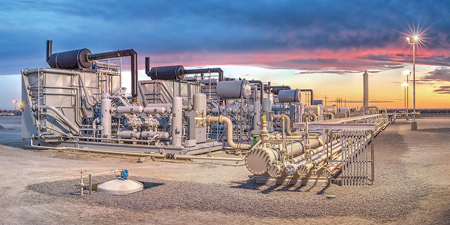Gas Processing News
Gazprom moves into digitization
Russia’s Gazprom Neft has confirmed the digital transformation of its business as a priority area of focus, with the creation of a new “Digital Transformation Directorate” to be headed by Andrei Belevtsev as Chief Digital Officer (CDO).
The key objective of the Digital Transformation Directorate will be to create a single and inclusive system covering the company’s full digital strategy, directed at game-changing improvements to the operational efficiency of all business processes, as well as the development of the company’s own “smart services.”
Commencing work in April 2018, the structural unit has now set about creating a long-term digital strategy for the company. The strategy encompasses plans for implementing new technologies, transforming organizational processes and engendering a team culture in testing IT solutions. The new Directorate will approve the company’s “roadmap” for digitization, assess opportunities for synergies across the most viable projects, and be involved in accelerating corporate change and developing digital competencies throughout the business.
Gazprom plans to develop its own IT platforms to create new information flows and datasets, and to develop predictive analysis tools, with the requirements and architecture for a prototype platform already being developed. Gazprom also plans to develop new products and services based around the implementation of cutting-edge digital technologies.
The company has already implemented a range of successful projects over the past 2 yr, including the implementation of blockchain technologies, AI systems, big data predictive analysis systems and the Industrial Internet of Things. The creation of “digital twins” for wells, drilling sites and refining facilities has also proved highly effective.
The Digital Transformation Directorate will help Gazprom collate information and data on its projects and experience in implementing new digital processes, as well as determine strategies for the further development of these projects and technologies.
Systems for Trans-Anatolian pipeline
Over the past 15 yr, ABB has delivered control and electrical solutions to the BTC and SCP pipelines in Turkey and the Caucasus, to the Sangachal terminal and to seven offshore platforms in the Caspian Sea. When the Trans–Anatolian Pipeline (TANAP) is completed, more than 4,500 km of pipeline in the region—supplying more than 5% of Europe’s gas—will be controlled by ABB’s SCADA System. ABB will deliver telecommunications, security and control infrastructure to contribute to secure and reliable operation of the pipeline throughout its lifetime.
TANAP is the largest-diameter and longest (1,850 km) pipeline ever built in Turkey. The $11-B pipeline will cross 20 districts to bring Azerbaijan’s natural gas through Georgia, Turkey and Greece directly to Europe. TANAP will interconnect with the South Caucasus Pipeline (SCPx) at Turkey’s border with Georgia, as well as with the Trans Adriatic Pipeline (TAP) at its border with Greece.
TANAP will include seven compressor stations, four measuring stations, 11 pigging stations, 49 block valve stations and two offtake stations. The challenges of the project include a tight schedule, extreme climate changes and several geographical hurdles. The pipeline will need to cross natural and human-made obstacles, including mountains with steep slopes, marshes, roads, railways, existing pipelines and the congested Dardanelle Straits.
 |
High-recovery cryogenic gas processing plant
Honeywell UOP’s Russell business will provide a high-recovery cryogenic gas processing plant to Caprock Midstream for its Pecos Bend facility in West Texas. The new plant is designed to extract 99% of ethane and 100% of propane and heavier hydrocarbons from natural gas in the Permian basin.
Honeywell’s UOP Russell solution includes the design, supply and installation of a modular cryogenic plant; refrigeration, dehydration and acid gas removal units; a facility control system; a flare system; and required electrical equipment. The turnkey plant design streamlines project schedules and is preconfigured for the specific gas composition in that location.
In addition, the plant will use Process Insight Reliability Advisor, a Honeywell Connected Plant service that provides ongoing monitoring, early event detection and mitigation of performance issues. Reliability Advisor leverages Honeywell UOP process simulators and fault models configured to each operation, recommending plant-specific solutions that can help customers avoid losses in productivity.
The plant uses an advanced cycle Recycle Split Vapor (RSV) process to recover NGL from feed gas for use as petrochemical feedstock, enhancing the value of feed gas supplied to Caprock by independent gas producers. Honeywell UOP works directly with Ortloff Engineers Ltd., the inventor of RSV technology, to enable high and reliable performance of its modular plants. With Train 3 under construction and Train 4 in the engineering stage, Caprock will have expanded its processing capacity to 540 MMft3d by early 2019.
 |
Partnership with Stanford University’s Natural Gas Initiative
Gulf Energy Information, a leading provider of data and technical information for the global energy industry, announced that Energy Web Atlas (EWA) has entered into a partnership with Stanford University’s Natural Gas Initiative (NGI). EWA is a platform that allows users to examine real-time natural gas, petroleum refinery and pipelines project information.
As part of the new partnership, the NGI, a collaboration of more than 40 research groups, will be able to supplement its research with EWA’s industry-leading datasets covering the natural
gas industry.
The partnership will also facilitate distribution of the NGI’s research findings through EWA and its associated publications, including Gas Processing and Hydrocarbon Processing.
Energy Web Atlas is an ESRI-based platform that tracks more than 500 LNG facilities/projects and more than 3,670 natural gas pipelines (existing, planned and under construction). The dataset also incorporates historical commodity prices, shipping routes and vessel data, and specifications—including channel depths and maximum vessel size—for more than 3,600 ports.




Comments